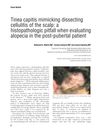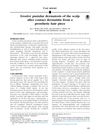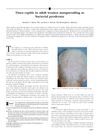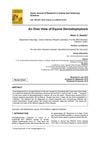 33 citations,
December 2013 in “Journal of cutaneous pathology”
33 citations,
December 2013 in “Journal of cutaneous pathology” A fungal infection can look like a different scalp condition in teens, leading to wrong treatment until proper tests are done.
 March 2014 in “Journal of clinical microbiology”
March 2014 in “Journal of clinical microbiology” Kerion, a scalp fungal infection, requires lab confirmation and is treated with antifungal medication and medicated shampoo.
 41 citations,
September 2007 in “Pediatric emergency care”
41 citations,
September 2007 in “Pediatric emergency care” Oral medication is necessary to treat scalp fungus in children, with griseofulvin being the usual choice.
 11 citations,
April 2016 in “The American Journal of Dermatopathology”
11 citations,
April 2016 in “The American Journal of Dermatopathology” Special and immunohistochemical stains are not routinely needed for diagnosing hair disorders.
 29 citations,
April 2013 in “Mycoses”
29 citations,
April 2013 in “Mycoses” A young man was initially misdiagnosed with a scalp condition but was found to have a fungal infection, which improved with antifungal treatment.
January 2007 in “Journal of the American Academy of Dermatology” Tinea can cause scarring alopecia in children, and fungal culture is crucial for diagnosis.
 53 citations,
November 1992 in “Mayo Clinic Proceedings”
53 citations,
November 1992 in “Mayo Clinic Proceedings” HIV can cause unusual and severe skin problems that are hard to treat.
 9 citations,
March 2017 in “JAAD Case Reports”
9 citations,
March 2017 in “JAAD Case Reports” A woman's scalp condition improved with specific ointment after a hair piece caused skin issues.
 June 2008 in “Springer eBooks”
June 2008 in “Springer eBooks” The document concludes that permanent hair loss conditions are complex, require early specific treatments, and "secondary permanent alopecias" might be a more accurate term than "secondary cicatricial alopecia."
 20 citations,
March 2017 in “Journal of cutaneous pathology”
20 citations,
March 2017 in “Journal of cutaneous pathology” Shrinking of oil glands in the skin is a key sign of hair loss linked to TNF inhibitor drugs and may improve if the treatment is stopped.
 20 citations,
July 2008 in “Dermatologic Therapy”
20 citations,
July 2008 in “Dermatologic Therapy” The document says that treating the root cause of hair follicle damage is crucial to prevent permanent hair loss, and treatment options vary.
6 citations,
April 2010 in “Arthritis Care & Research” Antituberculous drugs improved symptoms in a woman with lupus and myositis.
2 citations,
May 2020 in “JAAD case reports” Ruxolitinib can cause a delayed skin reaction on the nose.
 July 2023 in “Journal of Clinical Medicine”
July 2023 in “Journal of Clinical Medicine” The document concludes that understanding hair follicle histology and the hair cycle is crucial for diagnosing alopecia.
 32 citations,
August 2003 in “Journal of the American Academy of Dermatology”
32 citations,
August 2003 in “Journal of the American Academy of Dermatology” Tinea capitis can be misdiagnosed as bacterial infection in adult women but is treatable with antifungal medication.
 2 citations,
January 2014 in “Springer eBooks”
2 citations,
January 2014 in “Springer eBooks” The book details skin conditions in older adults, their link to mental health, cancer treatment importance, hair loss remedies, and managing autoimmune and itchy skin.
16 citations,
September 2015 in “International Journal of Molecular Sciences” A specific gene variant causes severe skin issues and increases infection risk, requiring careful medical monitoring.
 65 citations,
November 2016 in “Journal of The American Academy of Dermatology”
65 citations,
November 2016 in “Journal of The American Academy of Dermatology” The document concludes that early recognition and treatment of primary cicatricial alopecia is crucial to prevent permanent hair loss.
 17 citations,
September 2012 in “Dermatologic Clinics”
17 citations,
September 2012 in “Dermatologic Clinics” The conclusion is that accurate diagnosis of different types of hair loss requires careful examination of tissue samples and understanding of clinical symptoms.
 13 citations,
September 2019 in “Clinical, Cosmetic and Investigational Dermatology”
13 citations,
September 2019 in “Clinical, Cosmetic and Investigational Dermatology” Early treatment of EPDS can improve outcomes and reduce recurrence risk.
 January 2023 in “Our Dermatology Online”
January 2023 in “Our Dermatology Online” An old recipe called "Champigny Saumure" might help treat a rare scalp condition.
 33 citations,
April 2017 in “American journal of clinical dermatology”
33 citations,
April 2017 in “American journal of clinical dermatology” Early treatment of superficial fungal infections in immunocompromised patients is crucial.
 22 citations,
April 2000 in “International Journal of Dermatology”
22 citations,
April 2000 in “International Journal of Dermatology” A 78-year-old farmer with lung disease had skin lesions from a fungal infection that healed completely with medication.
 65 citations,
January 2005 in “American journal of clinical dermatology”
65 citations,
January 2005 in “American journal of clinical dermatology” Children with scalp fungal infections need proper diagnosis and treatment, usually with antifungal medications, and newer drugs may offer quicker recovery.
 10 citations,
January 2016 in “Dermatology online journal”
10 citations,
January 2016 in “Dermatology online journal” Adults with persistent scalp issues unresponsive to typical treatments should be tested for the fungal infection tinea capitis to start the right antifungal medication.
 8 citations,
May 2010 in “Dermatologic clinics”
8 citations,
May 2010 in “Dermatologic clinics” New treatments for skin conditions in children include a preferred drug for birthmark reduction, proactive creams for eczema and vitiligo, a safe psoriasis medication, and special tissues and socks for eczema and fungal infections.
 October 2019 in “Asian Journal of Research in Animal and Veterinary Sciences”
October 2019 in “Asian Journal of Research in Animal and Veterinary Sciences” Young horses are more prone to a fungal infection causing hair loss and skin redness.
 May 2015 in “Journal of The American Academy of Dermatology”
May 2015 in “Journal of The American Academy of Dermatology” The treatments for fungal nail infection, hair loss in men, benign nail tumor, and chemotherapy-associated nail bed inflammation are effective and safe.
 41 citations,
April 2016 in “Journal of experimental botany”
41 citations,
April 2016 in “Journal of experimental botany” RACB in barley is crucial for cell polarity and nucleus positioning, aiding fungal infection.
 July 2003 in “British Journal of Dermatology”
July 2003 in “British Journal of Dermatology” Some skin conditions are associated with other serious diseases, and office microscopy may miss many fungal infections.

























